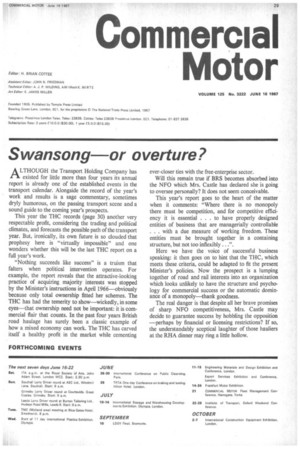Swansong or overture?
Page 31

If you've noticed an error in this article please click here to report it so we can fix it.
ALTHOUGH the Transport Holding Company has existed for little more than four years its annual report is already one of the established events in the transport calendar. Alongside the record of the year's work and results is a sage commentary, sometimes dryly humorous, on the passing transport scene and a sound guide to the coming year's prospects.
This year the THC records (page 30) another very respectable profit, considering the trading and political climates, and forecasts the possible path of the transport year. But, ironically, its own future is so clouded that prophesy here is "virtually impossible" and one wonders whether this will be the last THC report on a full year's work.
"Nothing succeeds like success" is a truism that falters when political intervention operates. For example, the report reveals that the attractive-looking practice of acquiring majority interests was stopped by the Minister's instructions in April 1966—obviously because only total ownership fitted her schemes. The THC has had the temerity to show—wickedly, in some eyes—that ownership need not be important: it is commercial flair that counts. In the past four years British road haulage has surely been a classic example of how a mixed economy can work. The THC has carved itself a healthy profit in the market while cementing ever-closer ties with the free-enterprise sector.
Will this remain true if BRS becomes absorbed into the NFO which Mrs. Castle has declared she is going to oversee personally? It does not seem conceivable.
This year's report goes to the heart of the matter when it comments: "Where there is no monopoly there must be competition, and for competitive efficiency it is essential . . . to have properly designed entities of business that are managerially controllable . . with a due measure of working freedom. These entities must be brought together in a containing structure, but not too inflexibly .. .".
Here we have the voice of successful business speaking: it then goes on to hint that the THC, which meets these criteria, could be adapted to fit the present Minister's policies. Now the prospect is a lumping together of road and rail interests into an organization which looks unlikely to have the structure and psychology for commercial success or the automatic dominance of a monopoly—thank goodness.
The real danger is that despite all her brave promises of sharp NFO competitiveness, Mrs. Castle may decide to guarantee success by hobbling the opposition —perhaps by financial or licensing restrictions? If so, the understandably sceptical laughter of those hauliers at the RHA dinner may ring a little hollow.




































































































































